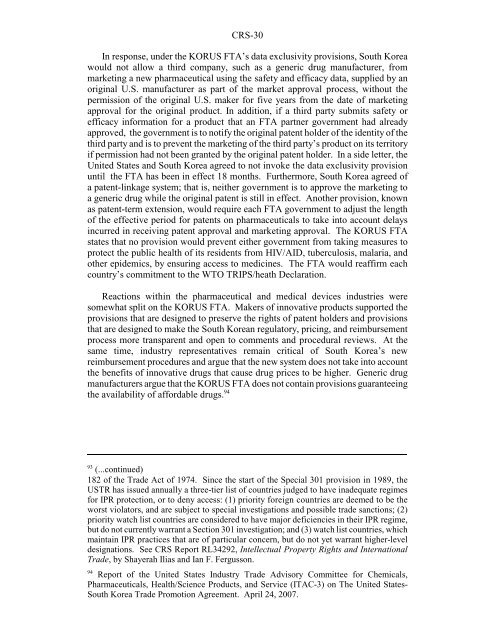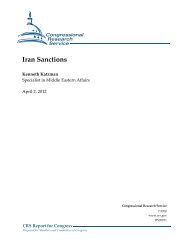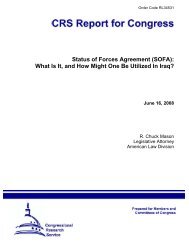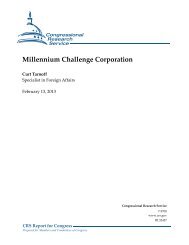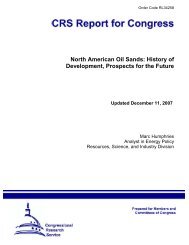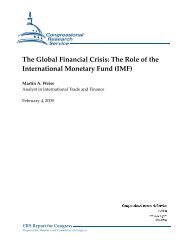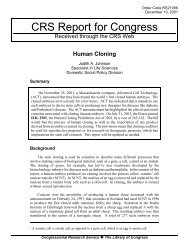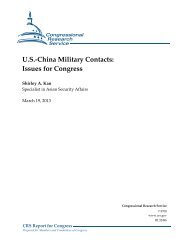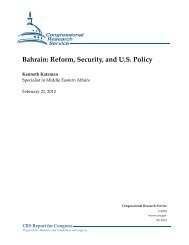The Proposed U.S.-South Korea Free Trade Agreement (KORUS ...
The Proposed U.S.-South Korea Free Trade Agreement (KORUS ...
The Proposed U.S.-South Korea Free Trade Agreement (KORUS ...
- TAGS
- korea
- fpc.state.gov
Create successful ePaper yourself
Turn your PDF publications into a flip-book with our unique Google optimized e-Paper software.
CRS-30<br />
In response, under the <strong>KORUS</strong> FTA’s data exclusivity provisions, <strong>South</strong> <strong>Korea</strong><br />
would not allow a third company, such as a generic drug manufacturer, from<br />
marketing a new pharmaceutical using the safety and efficacy data, supplied by an<br />
original U.S. manufacturer as part of the market approval process, without the<br />
permission of the original U.S. maker for five years from the date of marketing<br />
approval for the original product. In addition, if a third party submits safety or<br />
efficacy information for a product that an FTA partner government had already<br />
approved, the government is to notify the original patent holder of the identity of the<br />
third party and is to prevent the marketing of the third party’s product on its territory<br />
if permission had not been granted by the original patent holder. In a side letter, the<br />
United States and <strong>South</strong> <strong>Korea</strong> agreed to not invoke the data exclusivity provision<br />
until the FTA has been in effect 18 months. Furthermore, <strong>South</strong> <strong>Korea</strong> agreed of<br />
a patent-linkage system; that is, neither government is to approve the marketing to<br />
a generic drug while the original patent is still in effect. Another provision, known<br />
as patent-term extension, would require each FTA government to adjust the length<br />
of the effective period for patents on pharmaceuticals to take into account delays<br />
incurred in receiving patent approval and marketing approval. <strong>The</strong> <strong>KORUS</strong> FTA<br />
states that no provision would prevent either government from taking measures to<br />
protect the public health of its residents from HIV/AID, tuberculosis, malaria, and<br />
other epidemics, by ensuring access to medicines. <strong>The</strong> FTA would reaffirm each<br />
country’s commitment to the WTO TRIPS/heath Declaration.<br />
Reactions within the pharmaceutical and medical devices industries were<br />
somewhat split on the <strong>KORUS</strong> FTA. Makers of innovative products supported the<br />
provisions that are designed to preserve the rights of patent holders and provisions<br />
that are designed to make the <strong>South</strong> <strong>Korea</strong>n regulatory, pricing, and reimbursement<br />
process more transparent and open to comments and procedural reviews. At the<br />
same time, industry representatives remain critical of <strong>South</strong> <strong>Korea</strong>’s new<br />
reimbursement procedures and argue that the new system does not take into account<br />
the benefits of innovative drugs that cause drug prices to be higher. Generic drug<br />
manufacturers argue that the <strong>KORUS</strong> FTA does not contain provisions guaranteeing<br />
the availability of affordable drugs. 94<br />
93 (...continued)<br />
182 of the <strong>Trade</strong> Act of 1974. Since the start of the Special 301 provision in 1989, the<br />
USTR has issued annually a three-tier list of countries judged to have inadequate regimes<br />
for IPR protection, or to deny access: (1) priority foreign countries are deemed to be the<br />
worst violators, and are subject to special investigations and possible trade sanctions; (2)<br />
priority watch list countries are considered to have major deficiencies in their IPR regime,<br />
but do not currently warrant a Section 301 investigation; and (3) watch list countries, which<br />
maintain IPR practices that are of particular concern, but do not yet warrant higher-level<br />
designations. See CRS Report RL34292, Intellectual Property Rights and International<br />
<strong>Trade</strong>, by Shayerah Ilias and Ian F. Fergusson.<br />
94 Report of the United States Industry <strong>Trade</strong> Advisory Committee for Chemicals,<br />
Pharmaceuticals, Health/Science Products, and Service (ITAC-3) on <strong>The</strong> United States-<br />
<strong>South</strong> <strong>Korea</strong> <strong>Trade</strong> Promotion <strong>Agreement</strong>. April 24, 2007.


